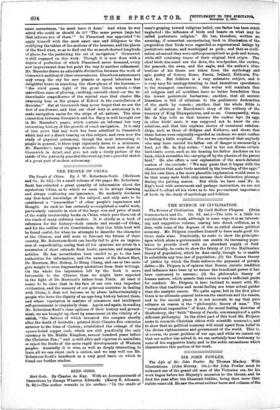BIRD GODS.
man's groping toward religious belief, one factor has been much neglected : the influence of birds and beasts on what may be called prehistoric religion." He has, therefore, written an amusing, if somewhat unconvincing, book in illustration of the proposition that birds were regarded as supernatural beings by prehistoric nations, and worshipped as gods ; and that as civili- sation advanced they were anthropomorphised as gods and heroes, while still retaining traces of their original bird origin. The chief birds discussed are the dove, the woodpecker, the cuckoo, the peacock, the swan, and the eagle, and the author's illus- trations of his thesis are taken from the mythology and epic poetry of Greece, Rome, Persia, Ireland, Esthonia, Fin- land, &c. But folklore is a very extensive subject, and it is very easy for analogy-hunting to lead incautious speculators to the strangest conclusions. One writer will maintain that all religion and all occultism have no better foundation than the lowest prehistoric barbarism; another, that all ancient literature is full of allusions to the prehistoric destruction of the earth by comets ; another, that the whole Bible is fall of allusions to Herodctus's story of the robbery of the treasury of King Rhampainitus, and so on. Consequently, when Mr. de Kay tells us that because the cuckoo lays its eggs in other birds' nests it was supposed not to know its own relations, and that this explains stories of unnatural relation- ships, such as those of CEdipus and Kullervo, and shows that these heroes were originally regarded as cuckoos, we must confess to feeling a little sceptical. Nor are we convinced that anybody who may have carried his father out of danger is necessarily a bird, yet Mr. de. Kay writes : "And in her son ZEneas certain bird-traits occur, such as his bearing his father Anchises on his back, which resembles the carrying off by the phcenix of his parent bird." He also offers a new explanation of the much-debated custom of the couvade : "We may guess that it began with the observation that male birds assisted in the brooding of the eggs." On his own lines, a far more plausible explanation would seem to be that many male birds only assume their distinctive plumage during the pairing season. But while we have read Mr. de Kay's book with amusement and perhaps instruction, we are not inclined to adopt all his views as to the pre-eminent importance of birds in the study of mythology and folklore.






















































 Previous page
Previous page